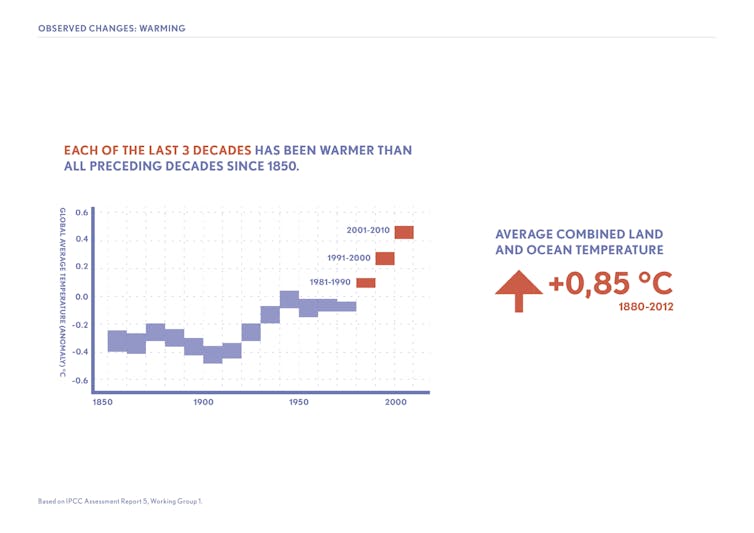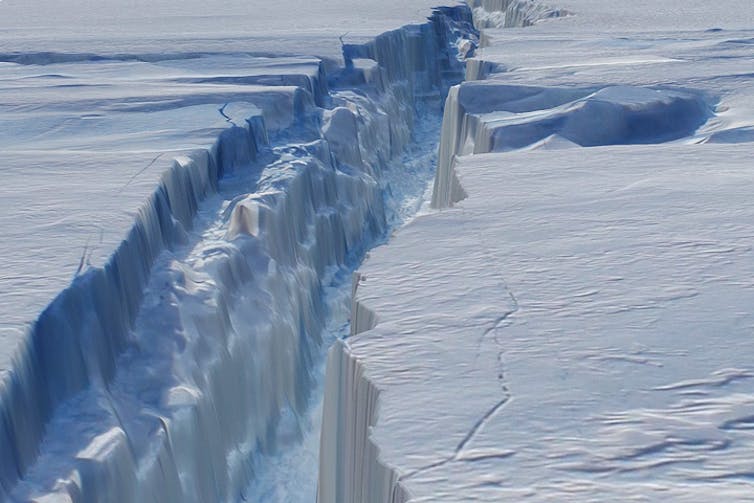If the Earth Were to Warm Up a Bit, What Would Happen?
Earth'south climate is changing rapidly. We know this from billions of observations, documented in thousands of periodical papers and texts and summarized every few years by the United Nations' Intergovernmental Panel on Climate change. The primary cause of that change is the release of carbon dioxide from burning coal, oil and natural gas.
International climate talks in Lima this week are laying the foundation for next year's Un climate summit in Paris. While negotiations about reducing emissions grind on, how much warming are we already locked into? If we stop emitting greenhouse gases tomorrow, why would the temperature continue to rise?
Basics of carbon and climate
The carbon dioxide that accumulates in the atmosphere insulates the surface of the Earth. Information technology's similar a warming coating that holds in heat. This energy increases the Earth'south surface average temperature, heats the oceans and melts polar ice. Equally consequences, ocean level rises and weather changes.

Since 1880, afterward carbon dioxide emissions took off with the Industrial Revolution, the average global temperature has increased about 1.5F (0.85C). Each of the last three decades has been warmer than the preceding decade, as well as warmer than the unabridged previous century.
The Chill is warming much faster than the average global temperature; ice in the Arctic Ocean is melting and the permafrost is thawing. Water ice sheets in both the Chill and Antarctic are melting. Ecosystems on both land and in the sea are changing. The observed changes are coherent and consistent with our theoretical understanding of the Earth'southward free energy balance and simulations from models that are used to understand by variability and to help us think virtually the future.

Slam on the climate brakes
What would happen to the climate if we were to stop emitting carbon dioxide today, right now? Would nosotros return to the climate of our elders? The simple answer is no. In one case nosotros release the carbon dioxide stored in the fossil fuels we burn, information technology accumulates in and moves among the atmosphere, the oceans, the land, and the plants and animals of the biosphere. The released carbon dioxide will remain in the atmosphere for thousands of years. Merely after many millennia will it return to rocks, for example, through the formation of calcium carbonate – limestone – as marine organisms' shells settle to the bottom of the sea. But on time spans relevant to humans, once released the carbon dioxide is in our surround essentially forever. It does not become abroad, unless we, ourselves, remove information technology.
If we stop emitting today, information technology'south non the end of the story for global warming. There'due south a delay in temperature increase as the climate catches upwards with all the carbon that's in the atmosphere. After maybe 40 more years, the climate will stabilize at a temperature higher than what was normal for previous generations.
This decades-long lag betwixt cause and upshot is due to the long time it takes to heat the ocean's huge mass. The energy that is held at the World by the increased carbon dioxide does more heat the air. It melts ice; it heats the sea. Compared to air, information technology'southward harder to enhance the temperature of water – information technology takes time, decades. Nevertheless, once the body of water temperature is elevated, it adds to the warming of the World'south surface.
So even if carbon emissions stopped completely right now, as the oceans grab upward with the atmosphere, the Earth's temperature would ascension near another 1.1F (0.6C). Scientists refer to this as committed warming. Ice, also responding to increasing heat in the bounding main, will proceed to melt. There's already convincing testify that significant glaciers in the Westward Antarctic ice sheets are lost. Ice, water, and air – the actress heat held on the Earth by carbon dioxide affects them all. That which has melted will stay melted – and more volition melt.
Ecosystems are altered by natural and manmade occurrences. Equally they recover, information technology will be in a different climate from that in which they evolved. The climate in which they recover will not be stable; it volition exist continuing to warm. There volition be no new normal, just more than change.
All-time of the worst case scenarios
In any event, it'due south not possible to end emitting carbon dioxide today, right at present. Despite pregnant advances in renewable energy sources, total demand for energy accelerates and carbon dioxide emissions increase. I teach my students that they need to plan for a earth 7F (4C) warmer. A 2011 report from the International Energy Agency states that if we don't get off our current path, and so we're looking at an Earth 11F (6C) warmer. Our current Earth is only over 1F warmer, and the observed changes are already disturbing.
In that location are many reasons that we need to essentially eliminate our carbon dioxide emissions. The climate is irresolute apace; if that stride is slowed, the affairs of nature and human beings can adapt more readily. The total amount of change, including body of water-level ascension, tin can be express. The further nosotros get abroad from the climate that we have known, the more unreliable the guidance from our models and the less likely we will exist able to prepare. The warmer the planet gets, the more likely reservoirs of carbon dioxide and methane, some other greenhouse gas that warms the planet, will be released from storage in the frozen Arctic permafrost – further adding to the problem.
If we stop our emissions today, nosotros won't go back to the by. This is non reason, notwithstanding, to continue with unbridled emissions. We are adaptable creatures, with apparent knowledge of our climate's future and how we tin can frame that future. We're already stuck with some amount of guaranteed climatic change at this point. Rather than trying to recover the past, nosotros need to be thinking about best possible futures.
Source: https://theconversation.com/what-would-happen-to-the-climate-if-we-stopped-emitting-greenhouse-gases-today-35011
0 Response to "If the Earth Were to Warm Up a Bit, What Would Happen?"
Post a Comment